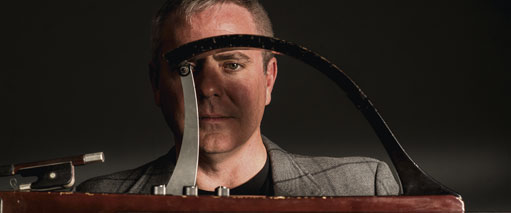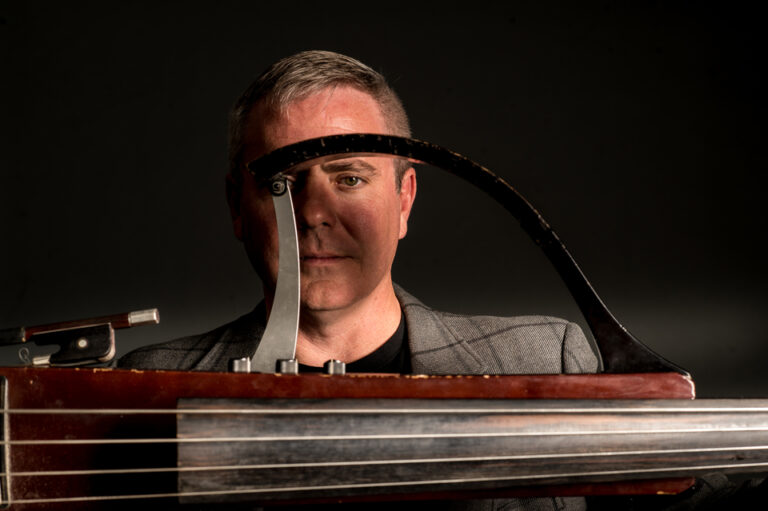All this machinery/ Making modern music/ Can still be open-hearted/ Not so coldly charted/ It’s really just a question/ Of your honesty/One likes to believe in the freedom of music … “Spirit of Radio,” by Rush, lyrics by Neil Peart.Such were the ideas spinning through my caffeine-soaked head on Wednesday afternoon, while I waited for bassist James Whiton to amble through the door to the office I use here at Weekly Alibi headquarters. I hadn’t slept well the night before, on account of certain musical obsessions that had lately been borne on the wings of after-work wondering and worrying. In case you want to know, one had to do with how the Goldberg Variations is a composition that wraps itself around its own form, variously bifurcating and reproducing in the air like some golden and infinite group of green branches. But at that point in my narrative distraction, Whiton appeared at said door, bearing two cups of espresso from Deep Space Coffee.I’ve known James since college. Back then he was a fellow UNM College of Fine Arts undergrad whose placement in the nascent but still prestigious double bass program being developed by music faculty Mark Tatum was certainly due to overarching talent and motivation. Whiton was also the bassist for the heady, happy and high-lariously popular space-rock band Apricot Jam. Taken together such steadfast stations early in one’s creative life portend well.After college, Whiton became an essential part of the Eric McFadden Trio, raised his sails and followed a haunting headwind out to Califas, where he practically struck gold. But as always happens in life, things didn’t continue to go as projected. Filled up with success and the stress that comes with managing a successful post-Burque musical career, Whiton began to consider his roots, ultimately leaving the bright lights of the big city behind for a return to his creative headwaters here in the Duke City.In the time since his auspicious return, Whiton has mastered the sea legs necessary to survive in the dusty ocean of this high desert. He plays gigs all over town, has recently joined in a very cool marriage and has a new CD out on Feb. 24 that aims to portray the artist in his own terms. Whiton told me all about those terms as we sat back to share coffee, memories and glimpses of what’s next for the low-octave virtuoso.Weekly Alibi: For those of our readers who aren’t familiar with you, what exactly is it that you’ve been doing?I love being in trios. Apricot Jam and the Eric McFadden Trio were loosely based in Albuquerque. As you know, the bass traditionally fulfills a supportive role in ensembles. I’ve always been trying to push that envelope. A trio really allows the bass a certain amount of freedom that disappears as you add players [to the group].That’s interesting you mention that. I’ve been listening to the Bill Evans Trio—with Scott LaFaro on bass—and have been fascinated by the intense melodic decisions he makes … In a trio, there’s a lot more room to move away from just providing a rhythmic basis.Is that dynamic and dangerous bass playing why Apricot Jam and later, the Eric McFadden Trio, were such big deals?Partially. Dynamics are important. The trio with Eric ended up imploding. We spent 10 years playing and touring, 250-300 shows a year, together. I think in the end we were both kinda done with the other. I was in a really dark place. This album that I’m releasing now speaks to that, there is meaning behind the music. As the composer, that’s where I’m coming from, but I don’t expect listeners to necessarily interpret the music the same way I did. But that’s what it’s about to me: that dark time when I found redemption through what I did. There were some business issues, there were some personal issues … The chemistry I had with Eric, the way our approaches to our instruments meshed together made for the finest ensemble I’ve ever played in. I was able to be myself, …support what he was doing while presenting my own voice. It was good. We made four great records. Ultimately all of this is the reason why I am focused on solo work now. I’m moving on.How do you explain Apricot Jam, the earlier project?That was when I was in music school and playing mostly classical music. I was playing some jazz. That was really the first rock band, outside of a garage, that I was ever in. None of us knew how to approach marketing our music. But Miguel [Corrigan] over at the Dingo Bar gave us a break. He gave us every Sunday night and it became this destination for a certain subculture in Albuquerque and those folks could hang out while we were playing. There have been a few bands that have had profound success doing that, the spectacle, you know.The music becomes the spectacle becomes the scene, right?Right and it’s about seeing your friends. Miguel was paying us $100 a week to do our thing; at first there were times when we were playing to the bartender and two lonely hippie girls seated in the back. But four years later, we were outselling his Friday and Saturday night shows … but he’d still give us $100 afterwards. He wanted to invest in a long-term thing. When people ask me, how do I get started in this business, I tell them, find someone that is willing to grow with you, who will let you take an off night at their club. And you play every week. Every week. And you build a scene that way. How did these experiences lead you to where you are now, musically?The solo thing: I was given a loop pedal about 10 years ago. What I liked about it was that I could play bass and play strings. I’ve always been more of a bowed string player than an electric bass-guitar player, even though I made my living playing bass. Don’t get me wrong, but the bow is where I can really shine. Musically, the sound is very vocal, it sings. When you’re plucking an instrument, the note always has the same shape, an attack and a quick decay. With a bow the sound becomes much more like the human voice and can be sustained. Also classical phrasing and technique is something I don’t even have to think about; it’s in my veins, my mom played [with the NMSO] while she was pregnant with me. Before I was born, these forms were being imprinted onto my brain.What about the looping of sounds is significant in your work?I like to joke around about the loop thing. Finally, I get to have someone else play bass so that I can solo and play melodies. Rehearsal is very easy; I don’t have to worry about other players’ schedules, and I get to keep all the money! I think the response from audiences has been very interesting in that its intrinsically difficult to make a loop sound musical, to make it sound organic—because by its nature it’s mechanical and repetitive. But some of the music by composers like Philip Glass—where ostinato (a continuously repeated musical phase or rhythm) is the focus—have given me clues, and I’ve embraced that style.There is a sly dynamic at work in music like that; although listeners think it might be repetitive at first, it ends up being expansive and diffuse, am I right?It builds slowly. There may be an ostinato line that builds for a few minutes. Then there’s another line that goes over that, and the sound becomes very full—full of possibility and nuance.Bach did something similar with the Goldberg Variations, I’ve read. This expansive repetition is an amazing thing to discover about musical expression.Yeah, the Goldberg Variations. When they talk about that desert island disc, that and Kind of Blue are on my list. I honestly get sad halfway through Gould playing Bach’s composition when I realize it’s almost over. And see, there’s the challenge with me as far as the looping goes. What I love about Kind of Blue is the interaction of players meshing together. So making something that’s systematically beautiful and intertwining it with melody is very appealing to me, finally. I’m approaching my new work as a composer and not necessarily as a player.So you’ve played rocanrol, you’ve played jazz. Are you discovering a new form through this experimental approach?I’ve thought a lot about what would have happened if Apricot Jam would have hit. There were a couple of times we got really close. But I’m relieved we didn’t. I feel like when people have that kind of success, they get really locked into what they’re doing. When that band broke up, it led to one of the great musical growth periods of my life. I started playing with an African band and that’s when it started going nuts for me. It prepared me to get with Eric. And that experience with Eric prepared me for this, a deep and satisfying place that says it’s mine, that shares my identity as a composer and as a person. In terms of a groove, it all fits together now.
James Whiton performs Perchance to Dream, (his new recording)
With Special Guest,
Leeches of LoreFriday, Feb. 24 • 8pm doors • 9pm showPresented by Weekly Alibi and Colorwayat Meow Wolf1352 Rufina • Santa Fe • $10 • 21+










